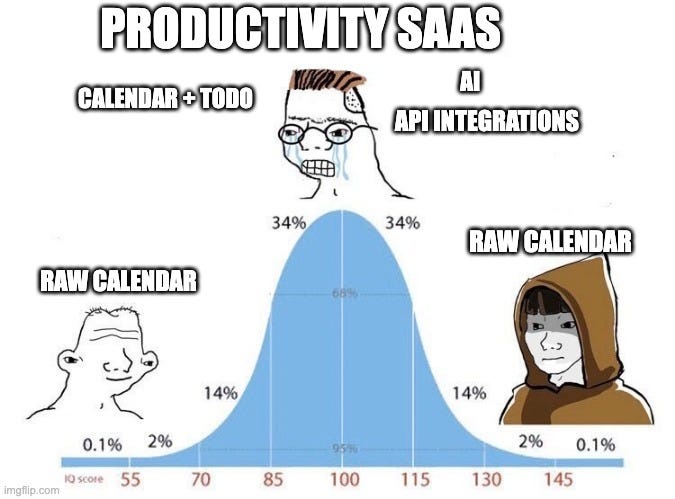I was wrong about calendar productivity optimization
The journey to find the optimal calendar process led to everyone else benefiting.
Some years ago, I boarded the SaaS train to what I thought was productivity heaven.
My destination was supposed to be better than the "normal" people using a basic calendar and to-do list system. I was an optimized, streamlined power user, someone who could do more, faster.
I had tools and services that worked seamlessly across desktop, mobile, and web, giving me synchronized access to my calendars and bookings across multiple accounts. What wasn’t I willing to pay for such speed and efficiency?
I had multiple inboxes to sift through, each needing to be triaged and organized. Naturally, this meant multiple calendars—because one wasn’t enough. I needed everything to be perfectly synced and viewable in real time. If someone wanted to book time with me, I needed an easy, frictionless way to share my availability so they could self-book. Ideally, they’d get a follow-up agenda and action items automatically tracked after the meeting.
It all had to be mobile-friendly so I could access it on the go and also fit seamlessly into my desktop environment. Everything had to be at a glance, editable on a whim, and—of course—optimized.
I was wrong.
Reading that paragraph now, it feels absurd. The reality is: if you're managing multiple inboxes across countless systems, you're probably doing C+ work at best.
Someone once told me, “Your inbox is someone else’s to-do list,” and I haven't been able to stop thinking about it.
I went deep down the productivity rabbit hole, subscribing to more services than I can count, convinced that squeezing out extra minutes or hours would be worth every penny. But those meticulously scheduled bookings and action items were pulling me away from what really mattered. A full calendar doesn’t mean you’re productive—it often means you’re just busy. Real productivity requires time to think, reflect, and context-switch properly between tasks.
The true cost of "supercharged" productivity isn’t on your wallet; it’s on your mind.
Calendar booking that’s slightly harder is actually an advantage. When booking takes effort, you think twice before committing. I used to be the fastest calendar-link slinger in the west, and I probably paid for it by missing out on work I should have been doing.
What I’ve realized is: letting other people book your time may be valuable to them, but managing your own time is invaluable to you.
It’s a subtle distinction—but an important one.
As of October 2024, my calendar "stack" has been stripped of unnecessary services and integrations. Here’s what I use now:
Cal.com for booking links, integrated with Zoom, allowing others to book 30-minute increments only in pre-approved blocks. My personal calendar has different time blocks than my work calendar.
A Safari shortcut to Google Calendar on my dock—because Safari lets you turn any web page into a shortcut. Just open Google Calendar, go to the Safari menu, and select "Create Shortcut."
That’s it.
This is a far cry from the over-engineered system I once relied on. I’m intentionally leaving out the old tools and services—not because they were bad, but because this isn’t about critiquing them. It’s about recognizing that more complexity doesn’t always lead to more productivity.
The simpler my system, the clearer my focus.




